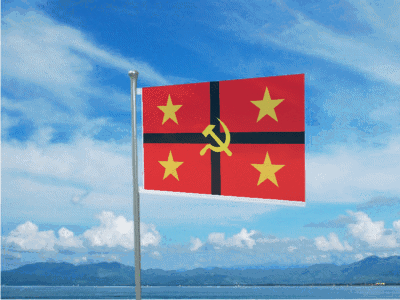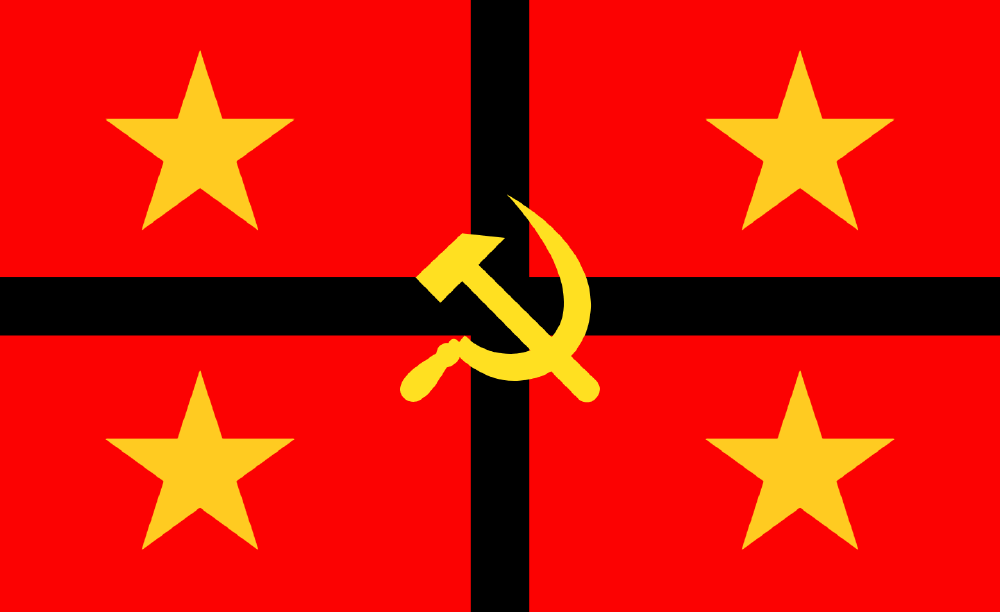 Harmonia, the Socialist Republic of Unity, is a nation forged in the crucible of struggle, emerging from the flames of civil conflict with a resolute spirit and a collective vision of a better future. Rooted in the principles of socialism, equality, and solidarity, Harmonia stands as a beacon of hope and progress in a world marked by division and inequality.
Harmonia, the Socialist Republic of Unity, is a nation forged in the crucible of struggle, emerging from the flames of civil conflict with a resolute spirit and a collective vision of a better future. Rooted in the principles of socialism, equality, and solidarity, Harmonia stands as a beacon of hope and progress in a world marked by division and inequality.
From its fertile plains to its rugged mountain peaks, Harmonia's landscape reflects the diversity and resilience of its people. Here, amidst the verdant valleys and bustling cities, citizens of different backgrounds and beliefs come together as one, bound by a shared commitment to building a society where every voice is heard, and every individual is valued.
At the helm of this socialist republic stands the Chairman, a symbol of unity and guidance, leading the nation forward on the path of progress and prosperity. Under the Chairman's leadership, Harmonia embraces the principles of collective ownership, social justice, and people-centered development, ensuring that the fruits of labor are shared equitably among all its citizens.
In Harmonia, education is a cornerstone of progress, empowering future generations with knowledge, skills, and opportunities to shape their destinies. Healthcare is a fundamental right, providing universal access to quality medical services and ensuring the well-being of every member of society.
As guardians of the nation's sovereignty, the People's Defense Forces stand ready to defend Harmonia's borders and uphold its socialist ideals. Grounded in the spirit of solidarity and internationalism, Harmonia extends a hand of friendship to all nations, standing firm in its commitment to peace, cooperation, and mutual respect.
In the heart of Africa, Harmonia shines as a beacon of hope, a testament to the power of unity, and a model for a world where justice, equality, and solidarity reign supreme.
| National Factbook |
| Flag: |
 |
| Nation Name: |
Harmonia |
| Leader Name: |
Alexei Petrov |
| Currency: |

Communist Dollar |
| National Animal: |

Elephant |
| History: |
Harmonia, the Socialist Republic of Unity, is a nation forged in the crucible of struggle, emerging from the flames of civil conflict with a resolute spirit and a collective vision of a better future. Rooted in the principles of socialism, equality, and solidarity, Harmonia stands as a beacon of hope and progress in a world marked by division and inequality.
From its fertile plains to its rugged mountain peaks, Harmonia's landscape reflects the diversity and resilience of its people. Here, amidst the verdant valleys and bustling cities, citizens of different backgrounds and beliefs come together as one, bound by a shared commitment to building a society where every voice is heard, and every individual is valued.
At the helm of this socialist republic stands the Chairman, a symbol of unity and guidance, leading the nation forward on the path of progress and prosperity. Under the Chairman's leadership, Harmonia embraces the principles of collective ownership, social justice, and people-centered development, ensuring that the fruits of labor are shared equitably among all its citizens.
In Harmonia, education is a cornerstone of progress, empowering future generations with knowledge, skills, and opportunities to shape their destinies. Healthcare is a fundamental right, providing universal access to quality medical services and ensuring the well-being of every member of society.
As guardians of the nation's sovereignty, the People's Defense Forces stand ready to defend Harmonia's borders and uphold its socialist ideals. Grounded in the spirit of solidarity and internationalism, Harmonia extends a hand of friendship to all nations, standing firm in its commitment to peace, cooperation, and mutual respect.
In the heart of Africa, Harmonia shines as a beacon of hope, a testament to the power of unity, and a model for a world where justice, equality, and solidarity reign supreme. |
| Geography |
| Continent: |
Asia |
| Land Area: |
14,484.06 sq. km |
| Terrain: |
Harmonia's terrain is as diverse and captivating as its history. From rugged mountains to lush valleys, sprawling plains to pristine coastlines, the landscape of Harmonia is a tapestry of natural beauty.
In the north, towering mountain ranges dominate the horizon, their snow-capped peaks piercing the sky. Here, rugged terrain challenges adventurers and provides a refuge for diverse wildlife. Deep valleys cut through the mountains, cradling crystal-clear lakes and cascading waterfalls, offering breathtaking vistas at every turn.
Descending from the mountains, the landscape transitions into rolling hills and fertile plains. Rich soil nourishes vibrant forests, where towering trees reach for the heavens and wildlife thrives in abundance. Rivers meander through the countryside, their gentle currents carving pathways through the land and providing sustenance to communities along their banks.
To the south, Harmonia's coastline stretches for miles, dotted with sandy beaches and dramatic cliffs. Turquoise waters lap against the shore, inviting travelers to bask in the sun or explore the hidden treasures beneath the waves. Coastal cities bustle with life, their harbors bustling with activity as fishermen bring in their daily catch and ships set sail for distant shores.
In the heart of Harmonia, sprawling savannas and grasslands stretch as far as the eye can see. Here, herds of majestic animals roam freely, their silhouettes dotting the horizon against the backdrop of the setting sun. Nomadic tribes traverse the plains, their traditional way of life intertwined with the rhythms of nature.
Throughout Harmonia, the land tells a story of resilience and adaptation. From the rugged mountains to the serene coastline, each terrain feature is a testament to the diverse ecosystems and rich biodiversity that make Harmonia a truly unique and captivating nation. |
| Highest Peak: |
Mt.Azure, 4 meters |
| Lowest Valley: |
kokishman, 200 meters |
| Climate: |
Harmonia experiences a varied and dynamic climate, influenced by its diverse terrain and geographical location. The nation's climate can be broadly categorized into several distinct regions, each with its own unique weather patterns and seasonal variations.
In the northern mountainous regions, the climate is characterized by cool temperatures and significant precipitation throughout the year. Winters are cold and snowy, with snowfall blanketing the landscape and transforming the mountains into a winter wonderland. Summers are mild, with pleasantly warm temperatures ideal for outdoor activities such as hiking and camping.
Descending from the mountains into the central plains and valleys, the climate becomes more temperate. Summers are warm and sunny, with occasional rainfall providing much-needed moisture for agriculture and sustaining the region's lush vegetation. Winters are mild to cool, with less snowfall than in the mountains but still enough to create picturesque scenes in higher elevations.
Moving southward towards the coast, Harmonia experiences a maritime climate characterized by mild temperatures and moderate rainfall throughout the year. Summers are warm and humid, with refreshing sea breezes providing relief from the heat. Winters are mild, with occasional rain showers and fog rolling in from the ocean.
In the interior savannas and grasslands, Harmonia's climate transitions to a semi-arid or even arid climate. Summers are hot and dry, with temperatures soaring during the day and cool breezes offering relief in the evenings. Rainfall is scarce, and droughts are not uncommon, making water conservation and sustainable agriculture critical in these regions.
Overall, Harmonia's climate exhibits a remarkable diversity, ranging from snowy mountains to sunny coastlines, and from humid forests to arid plains. This climatic variation contributes to the nation's rich biodiversity and offers something for everyone, whether they seek adventure in the mountains, relaxation on the beach, or exploration of the vast savannas. |
| People & Society |
| Population: |
715,207 people |
| Demonym: |
Harominans |
| Demonym Plural: |
Harominans |
| Ethnic Groups: |
Afarans - 45.0%
Togorians - 25.0%
Lokifinans - 15.0% |
| Languages: |
Afaric - 60.0%
English - 30.0%
Togor - 10.0% |
| Religions: |
Buddhist - 30.0%
Christian - 20.0%
Muslim - 50.0% |
| Health |
| Life Expectancy: |
75 years |
| Obesity: |
15% |
| Alcohol Users: |
2% |
| Tobacco Users: |
10% |
| Cannabis Users: |
2% |
| Hard Drug Users: |
5% |
| Economy |
| Description: |
Under a communist economic system, Harmonia's economy is organized around the principles of collective ownership of the means of production, central planning, and distribution according to need. In a communist framework, the government plays a central role in directing economic activity, with the goal of achieving social equality, eliminating class distinctions, and promoting the well-being of all citizens.
In Harmonia's communist economy, key features include:
Collective Ownership: The means of production, including land, factories, and resources, are owned and controlled collectively by the people, often through state ownership or worker cooperatives. This ensures that wealth and resources are distributed more equitably among the population.
Central Planning: Economic planning is centralized, with the government setting production targets, allocating resources, and coordinating economic activity across sectors. Central planning aims to ensure that resources are allocated efficiently and that production meets the needs of the population.
Distribution According to Need: Goods and services are distributed according to the principle of "from each according to his ability, to each according to his need." This means that basic necessities such as food, housing, healthcare, and education are provided to all citizens free of charge or at heavily subsidized rates, regardless of their ability to pay.
Emphasis on Social Welfare: Harmonia's communist economy prioritizes social welfare and the well-being of its citizens over profit and private accumulation. Policies are implemented to ensure access to healthcare, education, housing, and employment for all, with the goal of eliminating poverty and promoting social equality.
State Control: While private property may exist to some extent, particularly in small-scale enterprises and personal possessions, the commanding heights of the economy are controlled by the state. This includes key industries such as energy, transportation, and heavy manufacturing, which are owned and operated by the government.
In Harmonia's communist economy, the government works to balance economic development with social welfare, striving to meet the material and cultural needs of its citizens while promoting collective ownership, solidarity, and social justice. |
| Average Yearly Income: |
$100.81 |
| Gross Domestic Product (GDP): |
$377,304,287.00 |
| GDP per Capita: |
$527.55 |
| Gross National Income (GNI): |
$127,524,430.00 |
| Industries: |
Under Harmonia's communist economic system, industries are organized to serve the collective interests of the people, with a focus on meeting the nation's needs, promoting self-sufficiency, and advancing social welfare. While private enterprise exists to some extent, particularly in small-scale ventures and individual businesses, key industries are owned and controlled by the state or operated as worker cooperatives.
Agriculture: Agriculture is a cornerstone of Harmonia's economy, with a focus on subsistence farming, livestock rearing, and cash crops. The government invests in agricultural infrastructure, research, and extension services to improve productivity and ensure food security for the population.
Mining and Natural Resources: Harmonia is rich in mineral resources, including gold, copper, and gemstones, which are mined and processed to generate revenue for the state. Forestry and hydroelectric power generation also play important roles in the economy, providing employment and income for many communities.
Manufacturing: Manufacturing industries in Harmonia are geared towards producing goods for domestic consumption, such as textiles, food processing, and consumer goods. State-owned factories and cooperatives produce a range of products, from clothing and footwear to processed foods and household appliances.
Energy: Harmonia is investing in renewable energy sources such as solar, wind, and hydroelectric power to meet its energy needs sustainably. State-owned power plants and utilities generate electricity for residential, commercial, and industrial use, while also promoting energy conservation and efficiency measures.
Healthcare and Pharmaceuticals: The government prioritizes healthcare as a fundamental right and invests in the development of healthcare infrastructure, medical research, and pharmaceutical manufacturing. State-run hospitals and clinics provide free or subsidized healthcare services to all citizens, while pharmaceutical companies produce essential medicines and vaccines for domestic use.
Education and Technology: Education is a top priority in Harmonia, with state-funded schools, universities, and vocational training centers ensuring access to quality education for all citizens. The government also invests in technology and innovation, supporting research and development initiatives to drive economic growth and technological advancement.
Overall, Harmonia's industries are oriented towards meeting the needs of the population, promoting social welfare, and advancing the nation's self-reliance and development goals within the framework of a communist economic system. |
| Military |
| History: |
The military forces of Harmonia, known as the People's Defense Forces, were established concurrently with the birth of the nation in November 2045. Comprising ground, air, and maritime components, the People's Defense Forces were tasked with safeguarding the sovereignty and socialist principles of Harmonia, defending its borders from external threats, and maintaining internal security.
Ground Forces: The ground forces form the backbone of the People's Defense Forces, responsible for defending Harmonia's territory from land-based threats. Consisting of infantry, armored units, and artillery, the ground forces are trained and equipped to operate in diverse terrain, from rugged mountains to open plains. They also play a crucial role in supporting civilian authorities during times of emergency or natural disaster.
Air Defense Units: The air defense units of Harmonia are tasked with protecting the nation's airspace from aerial threats. Equipped with anti-aircraft weaponry and radar systems, these units are responsible for detecting and intercepting enemy aircraft, drones, and missiles that pose a threat to Harmonia's security. They work in coordination with ground forces and air units to ensure the integrity of Harmonia's airspace.
Maritime Patrols: Harmonia's maritime patrols operate along the nation's coastlines and territorial waters, securing maritime borders and protecting vital sea lanes. Utilizing patrol vessels and naval assets, these patrols conduct surveillance, interdiction, and search-and-rescue operations to safeguard Harmonia's maritime interests and combat illicit activities such as smuggling and piracy.
Civilian Militias: In addition to regular military forces, Harmonia maintains a system of civilian militias composed of trained volunteers from local communities. These militias serve as a reserve force, providing support to the regular military in times of crisis or emergency. They are often mobilized to assist with disaster relief efforts, border security, and other domestic tasks.
International Engagement: While primarily focused on defending Harmonia's sovereignty and socialist system, the People's Defense Forces also engage in international solidarity efforts. This includes participating in joint military exercises, providing training and support to allied nations, and contributing to peacekeeping missions under the auspices of international organizations.
Overall, the People's Defense Forces of Harmonia are structured to protect the nation's interests, uphold its socialist principles, and defend its sovereignty against external threats. Since their establishment, they have played a crucial role in shaping the nation's history and safeguarding its future as a proud socialist state. |
| Soldiers: |
55,307 |
| Tanks: |
370 |
| Aircraft: |
0 |
| Ships: |
10 |
| Missiles: |
0 |
| Nuclear Weapons: |
0 |
| Last Updated: 05/06/2024 01:30 pm |








 Harmonia, the Socialist Republic of Unity, is a nation forged in the crucible of struggle, emerging from the flames of civil conflict with a resolute spirit and a collective vision of a better future. Rooted in the principles of socialism, equality, and solidarity, Harmonia stands as a beacon of hope and progress in a world marked by division and inequality.
Harmonia, the Socialist Republic of Unity, is a nation forged in the crucible of struggle, emerging from the flames of civil conflict with a resolute spirit and a collective vision of a better future. Rooted in the principles of socialism, equality, and solidarity, Harmonia stands as a beacon of hope and progress in a world marked by division and inequality.










